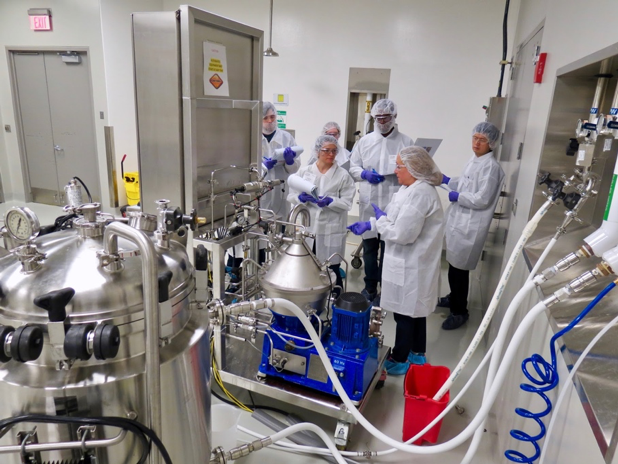NC State’s Biomanufacturing Training and Education Center (BTEC) provides both traditional students seeking industry skills and professional workers looking to learn new techniques an opportunity to get hands-on training in the fast-changing field of biomanufacturing. Through its academic and professional development programs, the unique, cross-disciplinary center is helping to transform the North Carolina workforce, grow the state’s economy, and benefit those who train there and, ultimately, the millions of patients worldwide who require life-saving medications and vaccines.
What distinguishes BTEC from other biomanufacturing training programs is its combination of industry-experienced instructors and support personnel; facilities and equipment; focus on hands-on education; the comprehensive scope of its academic and professional development programs; and its strong partnerships with stakeholders. Constructed with almost $39 million from the Golden LEAF Foundation, BTEC is located on NC State’s Centennial Campus in Raleigh.
Amanda Walter received her Master’s in Biomanufacturing from BTEC. She learned technical and professional skills and gained business experience that she puts into practice in her current role at Merck pharmaceutical company.
“BTEC provided hands-on, tangible work experience that is directly transferrable to my role now,” said Walter. “Most importantly, my time at BTEC gave me the confidence in my abilities to perform as an engineer by allowing me the ‘freedom to fail’ and learn outside of work.”
Academic programs
BTEC has worked closely with industry partners to develop and offer a range of academic programs for students with a variety of backgrounds, including engineering, the life sciences and chemistry.
Since classes began in fall 2007, BTEC has served more than 4,800 undergraduate and 2,300 graduate students in its courses. Typically, BTEC fills more than 400 undergraduate seats per semester, while graduate enrollment is approximately 300.
Even in the tightest of job markets, graduates of BTEC’s academic programs are virtually guaranteed to find employment. Within six months of graduation, 95% of undergraduates find employment or are accepted into a graduate program. For graduate students, that rate is 98%. More than 85% of its undergraduate minors and master’s graduates work in North Carolina after graduation.

Professional development program
As part of its overall mission, BTEC works with industry to design, develop and deliver both open-enrollment courses and courses customized for specific firms. These courses enhance the knowledge and skills of biotechnology and biomanufacturing professionals, and almost all feature extensive hands-on laboratory activities.
To date, more than 3,000 industry professionals from more than 270 organizations have taken advantage of BTEC’s professional development courses. Clients include multinational biomanufacturing companies, contract manufacturing organizations, start-ups, universities, and many of the companies providing products and services that support the biopharmaceutical manufacturing industry.
In fact, Walter and her colleagues at Merck recently completed a professional development course at BTEC.
“We found it to be a very valuable experience to prepare us for the process development activities we are beginning at the Merck Durham site,” said Walter.
As part of its professional development program, BTEC has established a successful track record of working with federal agencies to provide specialized training. This includes an ongoing partnership with the U.S. Food and Drug Administration’s Office of Regulatory Affairs.
Hands-on education
Both BTEC’s academic courses and its professional development program emphasize hands-on training in the operation of equipment and processes that are unique to biomanufacturing. These experiences take place in laboratories with bench-scale and pilot-scale bioprocessing equipment similar or identical to that used in the industry.
Facilities and equipment
The largest facility of its kind, BTEC’s main building consists of laboratories with bench-scale and pilot-scale bioprocessing equipment. The main building and the annex feature more than $15 million of industry-standard equipment, an analytical laboratory dedicated to teaching and methods development, and a simulated cGMP (current Good Manufacturing Practice) pilot facility capable of producing biological products using cell growth and expression, recovery and purification processes.
“BTEC provided hands-on, tangible work experience that is directly transferrable to my role now.”
Amanda Walter, Process Support Lab, Technology, Merck